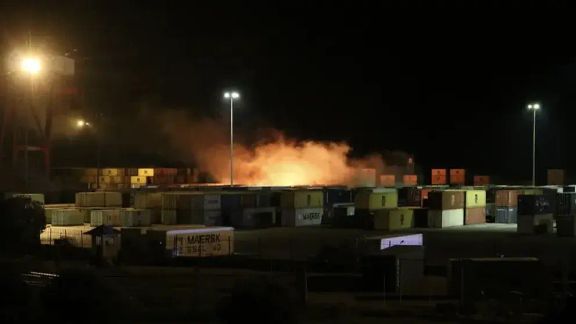Israeli airstrikes in Syria target Iranian-linked sites

Israeli airstrikes hit multiple locations in western Syria early on Thursday, targeting sites associated with Iranian interests, according to Syrian media and regional reports.

Israeli airstrikes hit multiple locations in western Syria early on Thursday, targeting sites associated with Iranian interests, according to Syrian media and regional reports.
Among the targets was a car manufacturing plant in the industrial town of Hisyah, 30 kilometers south of Homs, where Israeli forces caused material damage, as reported by Syria's state news agency, SANA.
"At around 1:00 am (2200 GMT Wednesday), the Israeli enemy launched an air attack... targeting a car assembly factory in the industrial area of Hisyah in Homs province" and a military position in Hama, state news agency SANA said, citing a military source.
This comes a day after an Israeli airstrike near the Iranian embassy in Damascus reportedly killed Mohammad Reza Fallahzadeh, the deputy commander of Iran's Quds Force.
The strike, which occurred in the Mezzah district of Damascus, left seven dead and 11 others injured, according to Syrian state media. The attack also caused damage to nearby buildings, leading to widespread destruction in the area.
In addition to the strike on Hisyah, the Syrian Observatory for Human Rights, an independent monitoring group, confirmed that Israeli forces also targeted the southern outskirts of Hama. Meanwhile, Al Arabiya reported that Israeli airstrikes also hit the Al-Kiswah area, southwest of Damascus, a known hub for Iranian military activity in Syria. According to these reports, the Al-Kiswah attack specifically targeted a base associated with a group linked to Iran.
The Hisyah plant, identified as the Iranian car manufacturer Saipa factory, which has ties to Iranian operations, was struck for the second time in less than a week. The factory’s Iranian CEO, Ahmad Karegar, stated that the facility had been designated an "international relief headquarters" and claimed that the land the factory occupies belongs to Iran. He added that despite the Israeli strikes, the production line of the factory remained intact.
However, analysts have speculated that the site may serve a dual purpose, functioning not only as a car manufacturing plant but also as a hidden arms depot for Iran and Hezbollah. The size of the factory, spanning 30 hectares, and the precision of the Israeli strikes have fueled suspicions that it may be used to store military equipment and weaponry, though Israel has not publicly claimed responsibility for these attacks.
These strikes come amid heightened tensions in the region following Iran’s missile attack on Israel. Iran has been increasingly active in Syria, where it supports Hezbollah and other militias operating in the country. Israel has conducted hundreds of airstrikes on Iranian-linked sites in Syria in recent years, aiming to prevent Tehran from establishing a strong military foothold near its borders.